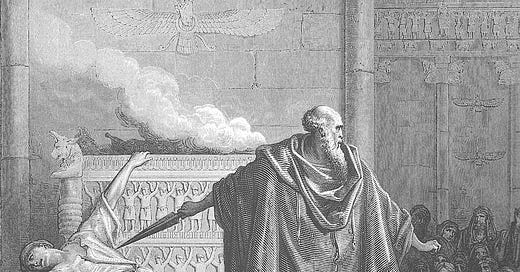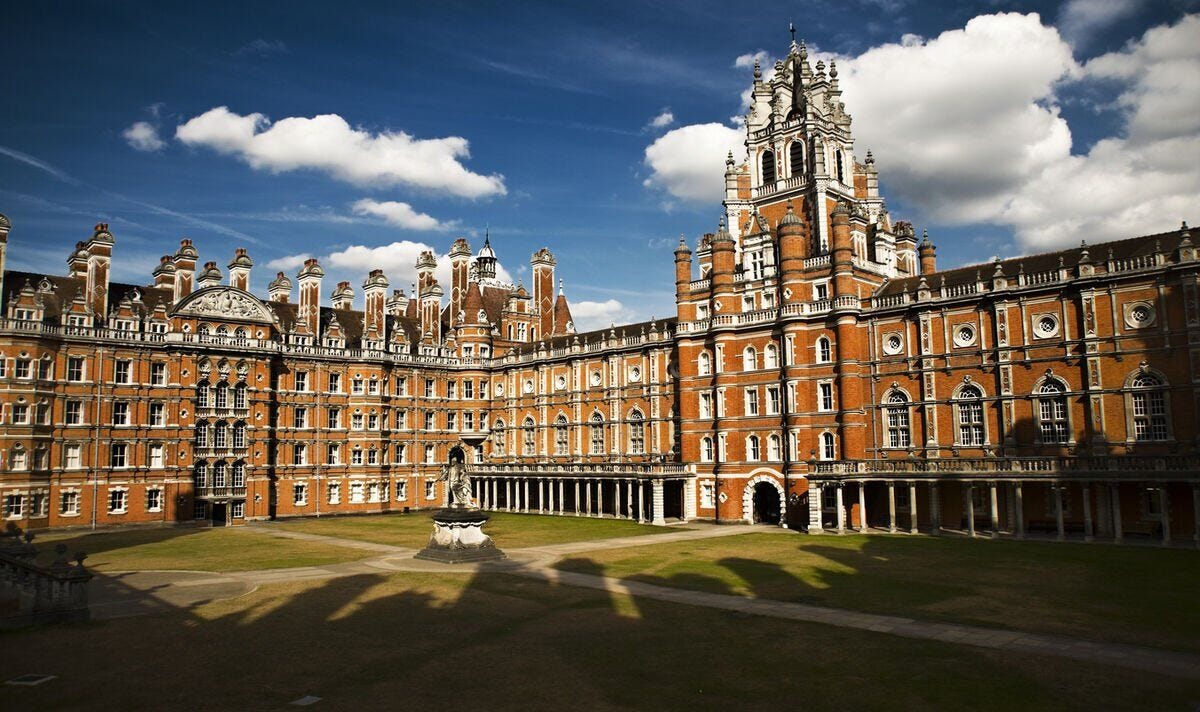Here, I discuss the evolution of my political consciousness, plus the fate of heterodox thinkers in the academy.* I wrote about this for a book of essays by “political dissidents” (basically, non-leftists) in the academic world.
[ *Based on: “Reflections of an Apostate,” pp. 155-70 in Dissident Philosophers: Voices Against the Political Current of the Academy, ed. T. Allan Hillman & Tully Borland (Rowman & Littlefield, 2021). ]
1. A Radical Libertarianism
As you probably know if you’re reading my blog, I am an anarcho-capitalist. An-caps believe that the ideal society would have no central authority. Instead, services such as police protection and adjudication of disputes (now done by the government) would be provided by a system of competing companies — private security agencies and arbitration firms. For more, see part 2 of The Problem of Political Authority. (This really cannot be explained in 1 paragraph.)
In that same book, I explain that (as I still think) the core of libertarianism is skepticism about authority: we don’t see why the government should get to do things that would be wrong for anyone else to do. If you are thus skeptical of authority, and you otherwise accept common sense morality, libertarianism is the result.
2. My Political Development
When I was a college freshman, I was sympathetic to some form of socialism (from which I am now an apostate). That’s mostly because I’d heard a bunch of bullshit about socialism and capitalism while doing high school debate (an activity that mainly teaches kids to make completely implausible, sensational claims in completely unpersuasive ways).
Around my first year of college, three separate people told me that I should read Ayn Rand. I started by reading an excerpt from Atlas Shrugged, which was a self-contained story about a car company that tried to implement Karl Marx’s famous dictum, “From each according to his ability, to each according to his need.” In essence, this results in everyone competing with each other to prove how great their needs are and how small their abilities. The company falls apart.
Ayn Rand was wrong about a lot of things, but she was right about this. And this is the fundamental point about socialism: It rewards need and penalizes productivity. Any society like that is going to fail. So I came over to capitalism.
At UC Berkeley around 1990, I met Bryan Caplan, who also studied there. He introduced me to anarcho-capitalism, through the works of David Friedman and Murray Rothbard. It turned out that this form of anarchism was not crazy, and the critics of anarchism are the ones who don’t know what they’re talking about (almost none of them even know what the anarchist view is, because they don’t read anything about it). I remained an an-cap ever since.
Around 2012, I wrote The Problem of Political Authority, dedicated to arguing (i) that no state has genuine authority, and (ii) anarcho-capitalism is the best form of social organization. Libertarians love that book.
3. Ideology and Bias in the Academy
3.1. Life as a Dissident Student
People sometimes ask me what it’s like to be a non-leftist in the notoriously left-wing-biased academy. As a student, I experienced no significant political bias (though that was long ago; today’s students probably experience much more bias).
3.2. Small Biases
There are many opportunities for political bias to affect one’s career in the academy. So much of one’s success turns on other people’s subjective judgments of “how good” one’s work is. Since the academy is overwhelmingly left-wing, other people are generally going to find you work more “plausible”, “interesting”, “compellingly defended”, etc., if you have a left-wing viewpoint than otherwise. You are thus going to have an easier time getting your papers published, getting promotions, getting invitations to write articles or give talks, winning prizes, etc.
Academia is extremely competitive. When we advertise jobs, we regularly get hundreds of applications for a single position. In the end, there will generally be at least several candidates who are all comparable and all highly qualified on objective measures. Departmental votes on whom to hire will thus usually be close. In such a situation, you really need every advantage you can get. If just one or two department members vote against you because you’re conservative, that’s very likely enough to cost you the job. Knowing this, conservatives are well advised to keep their mouths shut.
That’s why even a relatively small amount of political bias is enough to enforce ideological conformity. And there’s more than a little bias; academics are overwhelmingly left-wing, and they generally have negative feelings about conservatives and other non-leftists.
3.3. Large Biases
In recent years, academia has stepped up its racial, gender-based, and ideological discrimination. Many schools started requiring “diversity statements” for job applicants. These are basically statements where you talk about (a) how you’re a woman, a racial minority, LGBT, etc., and/or (b) how you’re a woke political activist. This helps schools engage in illegal racial and gender discrimination, as well as ideological discrimination (which is not illegal but is contrary to the stated policies of many institutions).
I didn’t mention this in the book chapter, but the American Philosophical Association maintains a website for assisting in illegal discrimination, the “Underrepresented Philosophers Directory”. Philosophers go there and list their race, gender, and other “identity group” characteristics, so that schools can then go there and look for, say, black philosophers to hire. That’s how brazen academics have become about thumbing their noses at the Civil Rights Act.
4. Understanding the Currents of the Academy
The politicization of the Academy began in the 1960’s. Then, there were two great causes that animated student and professor activists: civil rights, and the Vietnam War. Both were understandable. Thousands were dying in the war, with no obvious benefit. And American society at the time was full of blatant, unjust prejudice. Then, you didn’t need a PhD to detect the racism; people wore racism on their sleeves.
Besides helping to address serious injustices, these political movements also provided crucial psychological goods to their participants: they provided people with a sense of meaning in life, a community with shared goals, and a clear set of enemies. This creates psychological pressure to continue the movements.
Once the Vietnam war ended, one could not keep protesting it. But there was never a time when racism or other prejudice definitively ended in the way the Vietnam war did. Racism just gradually faded. Thus, intellectuals could keep developing increasingly sensitive racism-detectors in order to keep the movement going. They’ve been doing that for decades now. Each generation teaches the next generation how to play the game, then the next generation tries to come up with new theories about how the country is still full of racism.
When you have a group united by a common ideology, especially if there is also an opposed group with different beliefs (perhaps even the rest of society), a phenomenon known as groupthink tends to set in. Group members start to conflate loyalty to the group with dedication to the ideology. They then start competing with each other to find ways of being ever more extreme and fanatical in their devotion to the ideology, in order to secure their status in the group. That is what has happened to academia. They’ve now been at it so long, and devoted so much brainpower to the task, that they have bizarre theories utterly unrecognizable to the originators of the civil rights movement. In some cases, for example, today’s “anti-racists” are actually segregationists.
5. In Defense of Diversity
5.1. Learning from Disagreement
I support intellectual diversity: universities should have people with a variety of viewpoints. One reason for this is that it is unlikely that any one ideology has all the answers, and progress will often come from people outside the ideology criticizing its weak points.
Another reason is that students need to learn to reason cogently, and to do that, they need to confront people with differing viewpoints and try to think things through. If they are just taught a monolithic orthodoxy, they won’t learn how to think independently.
5.2. Escaping Groupthink
When there is too much ideological uniformity, groupthink sets in, as described above. Even if you started out with a basically correct ideology, it is going to degenerate as it becomes more extreme and fanatical.
5.3. Suppression Does Not Persuade
If you manage to suppress the expression of alternative viewpoints (e.g., silencing Charles Murray), that doesn’t persuade the people who hold those views that you’re right. On the contrary, they’ll probably conclude that you knew you couldn’t defend your views in open debate because your case is so weak. They’ll also probably hate you.
5.4. What of Established Truths?
But surely we shouldn’t have people with just any unorthodox viewpoint. E.g., biology departments shouldn’t hire Creationists, because Creationism just isn’t scientifically supportable.
Maybe political leftism is like that: maybe the reason why so many academics are leftists is that leftism is just overwhelmingly supported by the objective evidence, and rightism is just unsupportable.
But of course that’s false. Leftism is not supported to anything like the degree that, e.g., evolution is supported in biology. The main reason so many academics are leftists is that academia attracts people with certain personality traits, and people with those personality traits also gravitate toward left-wing political views. The evidence is pretty overwhelming that people pick political views based on their emotions and personality traits, rather than, say, being convinced by some objective evidence that they learn about in grad school.
Another reason why so many professors are left-wing is of course the discrimination long practiced by academics toward dissenters.
5.5. Encouraging Diversity
If intellectual diversity is good, what should we do about it? We could start by making a serious effort to stop discriminating against people with unorthodox viewpoints. We could, say, stop signing petitions to retract articles that undermine left-wing viewpoints; stop letting protestors shout down conservative speakers; stop requiring left-wing loyalty oaths for job applicants.
Should we have affirmative action for conservatives? I think this would be a reasonable thing to do, particularly for academic departments that are presently very ideologically uniform. It is not necessary to have equal representation for both left- and right-wing viewpoints. It is only necessary to have enough people with unorthodox viewpoints that those people will feel comfortable speaking up and the group will have to take their viewpoints seriously.
So if you have a humanities or social science department where everyone or almost everyone is on the left, I think you should consider giving at least some preference to people of diverse intellectual viewpoints.






Even persons holding a “correct” ideology would benefit from critics of bad implementations, which are always a risk. Such critics don’t necessarily need to deny the basic ideology, but such dissidents have a better motivation and escape the groupthink.
What is your advice for “heterodox” students who are considering careers in academia? Maybe they would be better off not pursuing academia at all. But for students who insist upon academic careers, should they keep quiet unless they get tenure and then speak up?